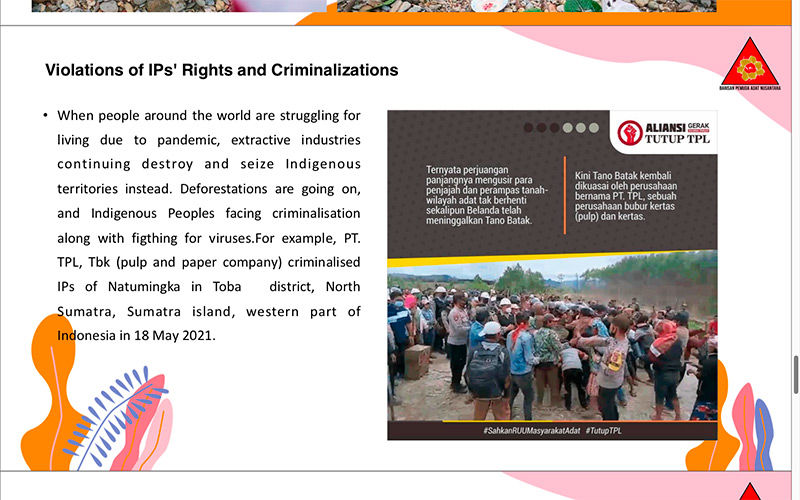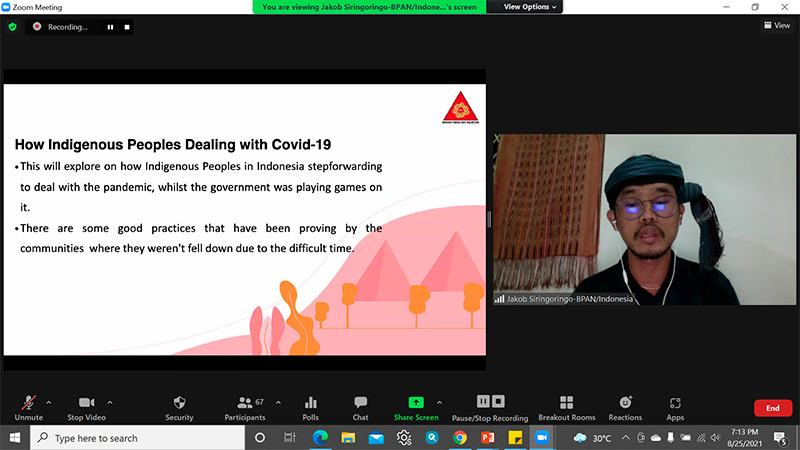65 youth attended the Thematic Workshop on the Indigenous Peoples’ Rights

ICF organized a virtual workshop on the theme “Uncovering the Plight of Indigenous People’s Rights and Access to Health Care during the COVID Pandemic.” The workshop took place on August 23-27, 2021 from 7:00 to 9:00 in the evening, Hong Kong time. Around 60 young people joined the workshop as regular participants. Some young people joined from Cambodia, Indonesia, Timor Leste, Myanmar, Mongolia, and Nepal, but the bigger delegations came from the Philippines and Bangladesh. The religions represented during this workshop included the Buddhist, Christians, Hindus, Muslims, and some coming from Indigenous traditions. The workshop was ICF’s way of expressing solidarity with the Indigenous Peoples as they celebrate August as the IP month and August 9 as the International Day of the World’s Indigenous Peoples. During the first four days, ICF had invited resource persons to speak on different topics.
 The first resource person was Ms. Victoria Tauli-Corpus, the former UN Special Rapporteur on the Rights of the Indigenous Peoples. She narrated the story of the beginnings and the hurdles in the process of the formulation of the rights of the Indigenous Peoples. Finally, the United Nations adopted the Declaration on the Rights of Indigenous Peoples (UNDRIP) that the UN General Assembly on a Thursday, September 13, 2007. Tauli-Corpus highlighted that the UNDRIP seeks to protect the collective rights of the IPs, because the individual rights are already protected by the UN Declaration of Human Rights. On the second day, two resource persons shared their experiences. One is a young Lumad teacher of the Bakwit Iskul (Evacuees’ School), Rose Hayahay from Mindanao. The other one is a young community development worker who volunteered to the cause of the Lumad, Rius Valle, the spokesperson of the organization called Save our Schools Network. Both Hayahay and Valle has shown the deplorable situation of the Indigenous Peoples. The IPs have defended their ancestral lands and mountains from the encroachments of the big mining and logging corporations – both national and foreign-owned. Consequently, they have forcibly left their homes because of harassments and assaults by the military that protect and pave the way for these corporations to enter the sacred areas of the Lumads. Hayahay and Valle showed images of burned and destroyed schools set up with the help of churches and religious groups, because the government did not offer educational services to the Lumads. Hayahay herself is red-tagged, a label that could become a license for the military or police to arrest her, or even take her life.
The first resource person was Ms. Victoria Tauli-Corpus, the former UN Special Rapporteur on the Rights of the Indigenous Peoples. She narrated the story of the beginnings and the hurdles in the process of the formulation of the rights of the Indigenous Peoples. Finally, the United Nations adopted the Declaration on the Rights of Indigenous Peoples (UNDRIP) that the UN General Assembly on a Thursday, September 13, 2007. Tauli-Corpus highlighted that the UNDRIP seeks to protect the collective rights of the IPs, because the individual rights are already protected by the UN Declaration of Human Rights. On the second day, two resource persons shared their experiences. One is a young Lumad teacher of the Bakwit Iskul (Evacuees’ School), Rose Hayahay from Mindanao. The other one is a young community development worker who volunteered to the cause of the Lumad, Rius Valle, the spokesperson of the organization called Save our Schools Network. Both Hayahay and Valle has shown the deplorable situation of the Indigenous Peoples. The IPs have defended their ancestral lands and mountains from the encroachments of the big mining and logging corporations – both national and foreign-owned. Consequently, they have forcibly left their homes because of harassments and assaults by the military that protect and pave the way for these corporations to enter the sacred areas of the Lumads. Hayahay and Valle showed images of burned and destroyed schools set up with the help of churches and religious groups, because the government did not offer educational services to the Lumads. Hayahay herself is red-tagged, a label that could become a license for the military or police to arrest her, or even take her life.
On the third day, the resource person was Jakob Siringoringo, Chair of the BPAN National Board, an indigenous youth alliance in Indonesia. He showed how the Batak Indigenous youth of North Sumatra tried to address the issue of hunger during the pandemic. They made use of unused land to farm, and plant vegetables that they can use and sell. Far from the city, their area does not suffer much from the impact of COVID-19. On the fourth day, two speakers address the issue of what the governments other entities (NGOs) do to support the indigenous people during the pandemic. A Lumad farmer and activist, Ms. Eufemia Cullamat is a member of the Philippine House of Representatives for the 18th Congress She gave her presentation in English but wanted the participants to listen to her language. She answered questions in her language with translation facilitated by the ICF Coordinator. She was straightforward in saying that the pandemic allowed the government to intensify its program of driving the Lumads out of their homes and ancestral lands. While the Philippine government recognizes the presence of the Indigenous Peoples, its leaders are selling out their lands and mountains to the big corporations, especially the foreign ones. She shared that was the non-government organizations, churches, and schools readily gave their assistance to the Indigenous peoples who evacuated from their homes. On his part, the resource person from Bangladesh, Sanjeeb Drong, from the Garo community and General Secretary of Bangladesh Indigenous People’s Forum, shared that while the government simply regard the Indigenous Peoples as “Tribals,” they have not experienced the militarization that the Lumads are experiencing in the Philippines. Yet, it does not mean that the IPs of Bangladesh do not experience discrimination and marginalization. He lamented over the danger of losing their indigenous cultures, languages, and spiritualities. And while the IPs are also affected by the pandemic, he highlighted that the greater issue that IPs all over the world face is the realization of Article 3 and 4 of UNDRIP. Article 3 says: “Indigenous peoples have the right to self-determination. By virtue of that right they freely determine their political status and freely pursue their economic, social and cultural development.” Article 4 continues: “Indigenous peoples, in exercising their right to self-determination, have the right to autonomy or self-government in matters relating to their internal and local affairs, as well as ways and means for financing their autonomous functions.” Tauli-Corpus regards these articles as the heart of the UNDRIP.
Listening to the stories during the workshop was very informative, exhilarating and heart-rending at the same time. At the end, everybody symbolically stood in solidarity with the IP struggle for self-determination, saying, “Long live, solidarity with the IPs!”
Muriel Orevillo-Montenegro
ICF Coordinator
